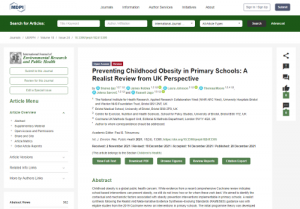How can schools help prevent childhood overweight and obesity? A realist review
Childhood obesity has been increasing rapidly in the UK for the last 30 years, and dramatically so as a result of COVID-19 restrictions. Now, one in four children start school with overweight or obesity and 40 per cent leave school with overweight or obesity (NHS Digital, 2021).
Schools are an important setting to try and improve the health of our children, given that they spend a quarter of their waking hours there. We know that schools cannot improve children’s health on their own, but the school setting presents an important opportunity for intervention. This isn’t a recent revelation and there have been a lot of programmes to prevent obesity delivered in schools over the last 30 years.
One way of summarising the impact of these interventions is in a Cochrane Review, which our research team helped to publish in 2019. It included the results from 153 studies, many of which were delivered in school settings, to children aged 4-18.
The results from the Cochrane Review tell us that some of these interventions help children maintain a healthy weight. However, they are often complex and very different from each other. This means we can’t easily tell which elements of an intervention might work, for which groups of children, and in which circumstances it might work best.
A ‘realist review’ is a research method that can help to answer some of these questions.
Project aims
We wanted to understand what contributes to an effective obesity prevention intervention in primary schools. We know that interventions are often affected by the context in which they take place. This could include:
- the different types of school
- the location of the school
- the funding and staff available
- what the children are like, such as age or level of deprivation
We wanted to learn more about these factors.
We also wanted to know what parts or processes of the intervention help it to work well. We could then use this knowledge to help decide what interventions might work best in primary schools in the UK.
What we did
We undertook a ‘realist review’ to try and answer these research questions. Realist reviews help us to find connections between the context or features of an intervention, and its effectiveness.
A core feature of a realist review is the development of a ‘programme theory’, with a range of factors and mechanisms that could influence the effectiveness of an intervention. We created ours by speaking with people who work in obesity prevention and UK primary schools.
We used our programme theory to analyse 24 studies included in the Cochrane Review. We developed the programme theory alongside analysing the studies, adding new factors or mechanisms as we found them. Once we had identified the factors and mechanisms in all 24 studies, we combined this information to explain how and why school-based obesity prevention interventions might work.
How we involved people
We consulted people working in or with UK primary schools through an online activity between March 2019 and January 2020. This helped us understand more about the capacity of schools to implement health improvement initiatives.
Twenty-one people responded to our questions. These included teachers, school management staff and members of other organisations working directly with schools. We used this information to develop the programme theory, to collect the right information and ensure that our results will be practical and useful.
What we found and what this means
It seems that being older, being a girl and having educated parents are important background factors for many interventions to work. We didn’t find any studies looking at socio-economic status as a factor. Mechanisms of an effective intervention were:
- How regular and long the children were exposed to the intervention for (dose)
- Changes in the environment, such as changing canteen food options or layout, or installing water fountains
- The parts of an intervention working together as a whole to be more effective than the sum of its parts
Educating children about health alone was not a feature that seemed to lead to positive change.
Obesity prevention in primary schools should go beyond health education. This is important because most interventions to date have been centred around educating children to make healthier choices, as we found in another of our studies.
Interventions must also be intense and long enough (dose) to have the desired effect of promoting a healthy weight in children. Environmental changes, such as changing the food available or the layout of the food in the canteen, enable healthier choices by providing alternative opportunities without placing responsibility on the child.
We found a large set of decent quality data which collectively indicates that we need to look beyond educational interventions targeting behaviour change in young children, as they have little agency. We should instead consider doing things that enable them to choose healthy behaviours.
When obesity prevention interventions are being developed, attention should be given to background factors such as the socio-economic status of children or the existing level of obesity in the school. This will help avoid widening health inequalities.
Watch the video of our findings
What next?
We hope our findings will help develop better obesity prevention interventions in UK primary schools. We plan to take our findings to primary school stakeholders and decision makers.
This work has also highlighted where more research is needed and avenues to explore in the future.
Paper

Preventing Childhood Obesity in Primary Schools: A Realist Review from UK Perspective
Read the paperRelated research
This project builds on the update to the preventing childhood obesity Cochrane Review.
Lead collaborators
- Professor Carolyn Summerbell, Durham University
- Laura Johnson, University of Bristol
ARC West Staff
Dr Sharea Ijaz
Research Fellow in Evidence SynthesisProfessor Russ Jago
Co-Theme Lead, Public HealthPartners on this project
University of Bristol
The University of Bristol is internationally renowned and one of the very best in the UK, due to its outstanding teaching and research, its superb facilities and highly talented students and staff. Its students thrive in a rich academic environment which is informed by world-leading research. It hosts the Elizabeth Blackwell Institute for Health Research.



